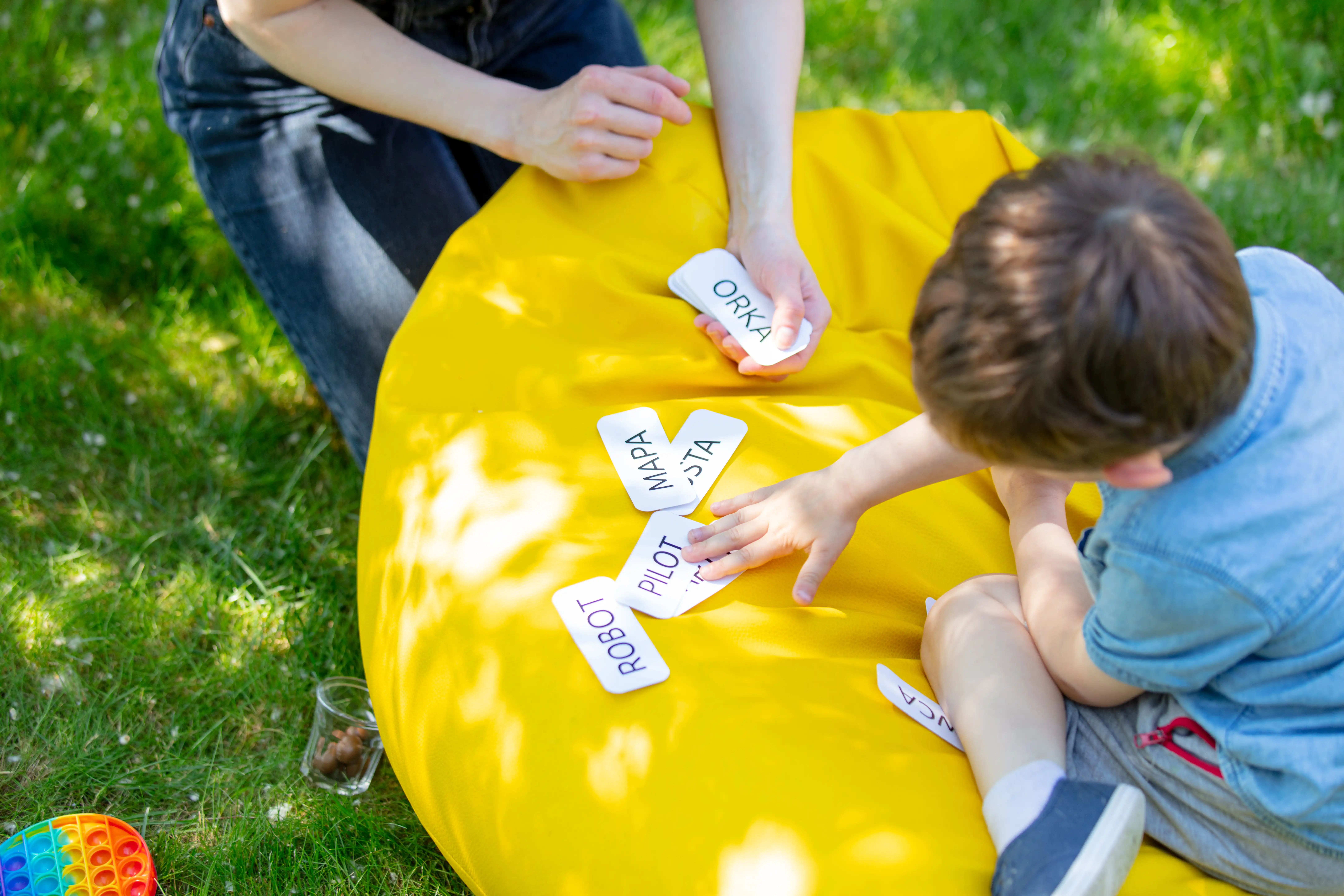Best Engaging Vocabulary Activities to Try with Your Child
Vocabulary games make new words easier to learn and remember. These playful activities support speaking, listening, and reading skills while helping kids use language confidently in everyday situations.

Vocabulary games for kids to grow word knowledge
Words are essential for proper and understandable communication. The more words you know, the better your reading, speaking, and writing will be. Expanding their vocabulary allows your kids to express their opinions more freely and better understand the world around them.
That’s why vocabulary activities are so important for kids, regardless of their age and cognitive abilities. For instance, toddlers may learn the names of their relatives and essential items; 4-year-olds can say simple sentences or give orders, and 5-year-olds can tell stories of at least two events.
Introduction to Vocabulary Building
Knowing many words is not a must for children. Instead, the most important thing is understanding their meaning and being able to use them in different contexts. A robust vocabulary is necessary for a child’s ability to express themselves clearly, understand others, and engage in meaningful conversations.
Importance of a Strong Vocabulary
A rich vocabulary with many words is essential for academic and social development. It allows your child to express their thoughts more freely, transparently, and accurately. A vast stock of words also enhances listening skills and the ability to engage in meaningful conversations.
When it comes to academic performance, it allows one to grasp complex texts, enhances writing skills, and impacts test scores positively. The more words are in receptive and expressive vocabularies, the more likely your kid is to use and recall them throughout their life.
Ideal Age to Start Vocabulary Activities
There is no universal standard for teaching vocabulary activities to children. Everything depends on their skills, curiosity, and preferences. Generally, you can start engaging your baby in them actively as soon as they turn 10 months old and say their first words. But even before that, you can simply talk to your child, explain things, and tell different stories. Later, reading books, playing word games with flashcards, and role-playing with toys will be very advantageous for learning new words.

Help your child
grow with Keiki
We’ll help you turn everyday screen time
into real learning progress.
Effective Vocabulary Games for Kids
Here are the popular options for spending time with your child and learning new words. Before you start playing, ask your child what they want to do and give them freedom of choice. Some are simple, and some are more sophisticated, so feel free to adapt our suggested options to your needs and situation.
Interactive Games and Puzzles
They can make learning new words more fun and engaging. Here are the common ideas for these games:
- Crossword puzzles offer clues for missing words that fit into spaces; they can be adapted to different ages.
- Word search puzzles enable children to find and circle the words in a grid of random letters.
- Hangman is a guessing game where kids need to figure out the word by guessing letters.
- Scrabble involves creating words from individual letters.
- Vocabulary charades are popular activities that involve explaining words with physical movement only.
Feel free to research for other ideas your child may enjoy. Discover their preferences and look for suitable vocabulary practice activities. There are plenty of online resources where you can find excellent options on interesting topics for your kid’s age.
Hands-on and Movement-based Activities
These games involve active child engagement. Besides improving cognitive abilities, movement-based activities enhance both fine and gross motor skills. They generally incorporate jumping, running, or playing with a ball, which helps develop overall body coordination and strength. Regular movement promotes physical development and health and reduces the risk of childhood obesity.
Games include various learning styles, such as kinesthetic, visual, and tactile. This will help you introduce various educational concepts more effectively. Besides, they often simulate real-world scenarios, allowing children to use what they have learned in practical contexts. This makes the overall learning process more engaging and relevant. You can use movement-based activities, such as arts and crafts, dancing, and outdoor play, to diversify your child’s experiences.
Reading and Storytelling as Vocabulary Activities
Reading books and doing activities with them is considered one of the most effective ways to broaden vocabulary. Books contain richer language than simple, everyday conversations. They can cover topics you don’t often come across in your daily life.
This vocabulary activity allows for seeing words in context and understanding their meaning from them. This makes it easier to comprehend and remember them correctly. Reading a book and then discussing it with your child through storytelling improves understanding and retention of new vocabulary.
You can also organize read-aloud sessions to improve your child’s reading skills. This way, they help children hear how words are pronounced and strengthen their phonemic awareness and pronunciation skills. Besides, analyzing and discussing different stories enhances a child’s critical thinking. It also encourages kids to use a broader range of words to express their thoughts, feelings, and opinions.
Ask your child to retell stories in their own words. This will motivate them to use new vocabulary and increase their confidence. All these activities are fun and motivating for your child.

Engaging Vocabulary Games
Here are tips for parents on adding fun vocabulary activities to their children’s everyday learning. Above all, we recommend being patient, supportive, and creative. You also need to give your kids space to express their wishes and interests. Allow them to choose activities, add their own rules, and adjust the learning process to their mood and wants.
Encouraging Consistent Practice
At the same time, you need to be flexible and adapt your learning process to your child’s needs, moods, and interests. You can combine various types of kindergarten vocabulary activities to ensure your kid has enough to choose from. For instance, you decide to read a book with your offspring. Don’t stop at reading only. Ask questions about the story, discuss new words, and encourage the child to guess meanings from context. You can even role-play the events from a story later.
You can also incorporate word of the day to encourage regular learning. Create a calendar with a new word for each day, introduce it, and use it in sentences throughout the day. Designate specific times for vocabulary practice. To motivate your child even more, you can add small rewards.
For instance, you can give them stickers daily for completing every activity or spend extra time playing afterward. The key is to be actively involved in their learning process, offering help and encouragement. Solve challenges together and ask children about their learning experience.
Positive Reinforcement Techniques for Teaching Vocabulary Activities
Doing any educational activity with your child involves parents’ active participation. If a kid is constantly praised, motivated, and assisted, it makes them more confident and eager to learn different things. Here are some suggestions for implementing positive reinforcement. The simplest and probably most effective way is to compliment your kid immediately when they use new words correctly. You can also give stickers, stars, or other small rewards for completing tasks.
Besides, adding different games or team activities can also be an excellent way to motivate your offspring. Encourage them to take part in bingo, quizzes, or other games and interact with other participants. This facilitates teamwork and makes learning not only about academic success but also about developing essential social skills.
When using online tools, you can see that many of them include praise, rewards, and other strategies for positive reinforcement. Such immediate positive feedback for correct answers encourages your child to learn more.
Tools and Resources for Enhancing Vocabulary
Although many activities don’t involve any resources, getting tools for education will help you broaden the variety of learning opportunities. Books are probably the most popular thing for vocabulary learning. Choose books with illustrations and compelling stories for your child. Read them together with your kid, then ask them to point to the characters in the pictures, describe the situations in them, and think about the possible scenarios for continuing the story.
There are lots of fun ways to learn vocabulary. For instance, you can get flashcards with different things, animals, etc., and their definitions. Make a pictionary with the words your kid remembers and recall them by pointing to various images. You can even allow your child to select books and other resources based on their preferences. This will help them become more independent and responsible.
Build real skills through fun, educational games for your child
Try KeikiKeiki World App: Best Vocabulary Activities for Different Ages
Keiki World App is a comprehensive learning tool for children aged 1–6. It encompasses a vast variety of resources for practicing different skills, including vocabulary. This app is focused on making kids’ screen time more productive and entertaining. Here are the advantages of using Keiki for your child’s learning:
- Development of essential skills. The activities in this app are concentrated on developing critical skills, including numeracy and literacy.
- Easy-to-use interface. This application is intuitive and easy to navigate for both children and parents. It allows children to learn independently without the need for constant supervision and help from adults.
- Engaging learning content. The Keiki app includes activities that make education fun and interactive. It provides educational games, interactive cartoons, and colorful vocabulary worksheets.
- Parental support. This app includes progress-tracking features so parents can support their child’s learning journey.
- Safe and controlled environment. It provides a secure environment for children to interact with and contains age-appropriate content only.
- Offline learning. You can download videos and activities on your device to enable sustainable learning even if there is no Internet access.
Keiki is a subscription-based service that offers various plans. Each plan includes Puzzles and Printable Worksheets for learners. The activities in this app are designed to meet the developmental prerequisites and interests of different age groups. You can choose from plans focused on your kid’s educational goals. Keiki offers a wide range of packs, such as Reading & Spelling Starter, Speech Development, Letters and Handwriting Starter, Creativity Boost, Dino Learning, Logic & Problem-Solving, and School Preps Roadmap.
Conclusion
Vocabulary activities for kindergarten can be fun, interactive, and effective. There are myriad ways to turn the educational process into entertainment. We hope that the ideas for engaging activities we offered in this article were helpful to you. They will help you combine the learning process with spending fun and quality time together. Feel free to adapt the suggestions from this article to your child’s needs and interests. You also need to pay attention to positive reinforcement and implement consistent vocabulary practice.






